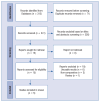Should targeted temperature management be used in cardiogenic shock patients? Systematic review and meta-analysis
- PMID: 36200546
- PMCID: PMC11544404
- DOI: 10.5603/CJ.a2022.0093
Should targeted temperature management be used in cardiogenic shock patients? Systematic review and meta-analysis
Abstract
Background: Therapeutic hypothermia, or targeted temperature management (TTM), is a strategy of reducing the core body temperature of survivors of sudden cardiac arrest, cardiogenic shock (CS) or stroke. Therefore, a systematic literature review and meta-analysis were performed to tackle the question about whether the implementation of TTM is actually beneficial for patients with CS.
Methods: Study was designed as a systematic review and meta-analysis. PubMed, Cochrane Library, Web of Science and Scopus were searched from these databases inception to July 17, 2022. Eligible studies were those comparing TTM and non-TTM treatment in CS patients. Data were pooled with the Mantel-Haenszel method.
Results: Thirty-day mortality was reported in 3 studies. Polled analysis of 30-day mortality was 44.2% for TTM group and 48.9% for non-TTM group (risk ratio: 0.90; 95% confidence interval: 0.75 to 1.08; p = 0.27). Other mortality follow-up periods showed also no statistically significant differences (p > 0.05). The occurrence of adverse events in the studied groups also did not show statistically significant differences between TTM and non-TTM groups (p > 0.05 for myocardial infarction, stent thrombosis, sepsis, pneumonia, stroke or bleeding events).
Conclusions: The present analysis shows no significant benefit of TTM in patients with CS. Moreover, no statistically significant increase of the incidence of adverse effects was found. However, further randomized studies with higher sample size and greater validity are needed to determine if TTM is worth implementing in CS patients.
Keywords: cardiogenic shock; meta-analysis; outcome; targeted temeparature management; therapeutic hypothermia.
Conflict of interest statement
Figures


References
-
- Hochman JS, Sleeper LA, Webb JG, et al. Early revascularization in acute myocardial infarction complicated by cardiogenic shock. SHOCK Investigators Should We Emergently Revascularize Occluded Coronaries for Cardiogenic Shock. N Engl J Med. 1999;341(9):625–634. doi: 10.1056/NEJM199908263410901. - DOI - PubMed
Publication types
MeSH terms
LinkOut - more resources
Full Text Sources
